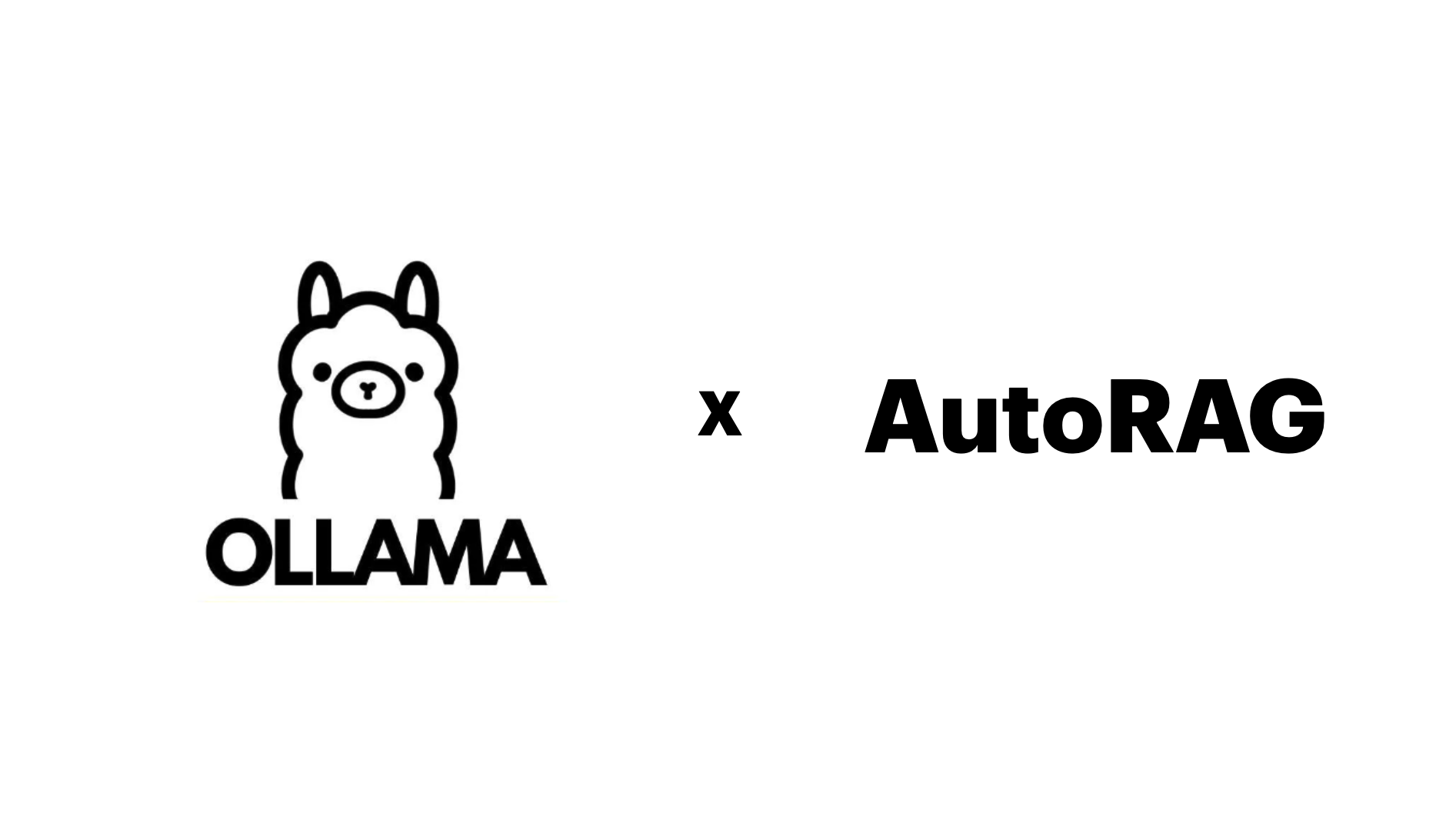OLLAMA x AutoRAG¶

Setting Up the Environment¶
Installation¶
First, you need to have both AutoRAG and Ollama installed. Refer to the links below for installation instructions:
Downloading the LLM Model¶
Download the LLM to be used with Ollama. In this documentation, we will use the “llama3” LLM. Enter the following command in the terminal to download the llama3 model.
ollama pull llama3
Running the Ollama Server¶
Run the Ollama server by entering the following command in the terminal.
ollama serve
Now, the setup is complete!
Writing the Config YAML File¶
To use AutoRAG, a Config YAML file is essential. By editing this YAML file, you can decide which modules to use, which LLM and embedding models to utilize, and which metrics to experiment with for RAG optimization.
You can use dozens of modules and parameter options, and various metrics. If you are curious about how to write the Config YAML file, refer to this link.
In this documentation, we designed a simple experiment using only retrieval, prompt maker, and generator (LLM). You can also check out the YAML file in the AutoRAG repository!
node_lines:
- node_line_name: retrieve_node_line
nodes:
- node_type: retrieval
strategy:
metrics: [ retrieval_f1, retrieval_recall, retrieval_precision ]
top_k: 3
modules:
- module_type: bm25
- module_type: vectordb
embedding_model: huggingface_all_mpnet_base_v2
- module_type: hybrid_rrf
target_modules: ('bm25', 'vectordb')
rrf_k: [ 3, 5, 10 ]
- module_type: hybrid_cc
target_modules: ('bm25', 'vectordb')
weights:
- (0.5, 0.5)
- (0.3, 0.7)
- (0.7, 0.3)
- module_type: hybrid_rsf
target_modules: ('bm25', 'vectordb')
weights:
- (0.5, 0.5)
- (0.3, 0.7)
- (0.7, 0.3)
- module_type: hybrid_dbsf
target_modules: ('bm25', 'vectordb')
weights:
- (0.5, 0.5)
- (0.3, 0.7)
- (0.7, 0.3)
- node_line_name: post_retrieve_node_line
nodes:
- node_type: prompt_maker
strategy:
metrics: [ meteor, rouge, bert_score ]
modules:
- module_type: fstring
prompt: "Read the passages and answer the given question. \n Question: {query} \n Passage: {retrieved_contents} \n Answer : "
- node_type: generator
strategy:
metrics: [ meteor, rouge, bert_score ]
modules:
- module_type: llama_index_llm
llm: ollama
model: llama3
temperature: [ 0.1, 0.5, 1.0 ]
batch: 1
The Key points of the YAML file are:
nodes:
- node_type: generator
strategy:
metrics: [ meteor, rouge, bert_score ]
modules:
- module_type: llama_index_llm
llm: ollama
model: llama3
temperature: [ 0.1, 0.5, 1.0 ]
batch: 1
Running AutoRAG¶
To run AutoRAG, you must have a QA dataset and a corpus dataset ready. Refer to this link for information on what data to prepare.
Once you are ready, create an empty directory. This directory will be the ‘project directory’ where all the optimization results of AutoRAG will be stored.
Now, enter the following command in the terminal to run AutoRAG! Make sure the Ollama server is running.
autorag evaluate \
--qa_data_path ./path/to/qa.parquet \
--corpus_data_path ./path/to/corpus.parquet \
--project_dir ./path/to/project_dir \
--config ./path/to/ollama_config.yaml
AutoRAG will automatically experiment and optimize RAG.